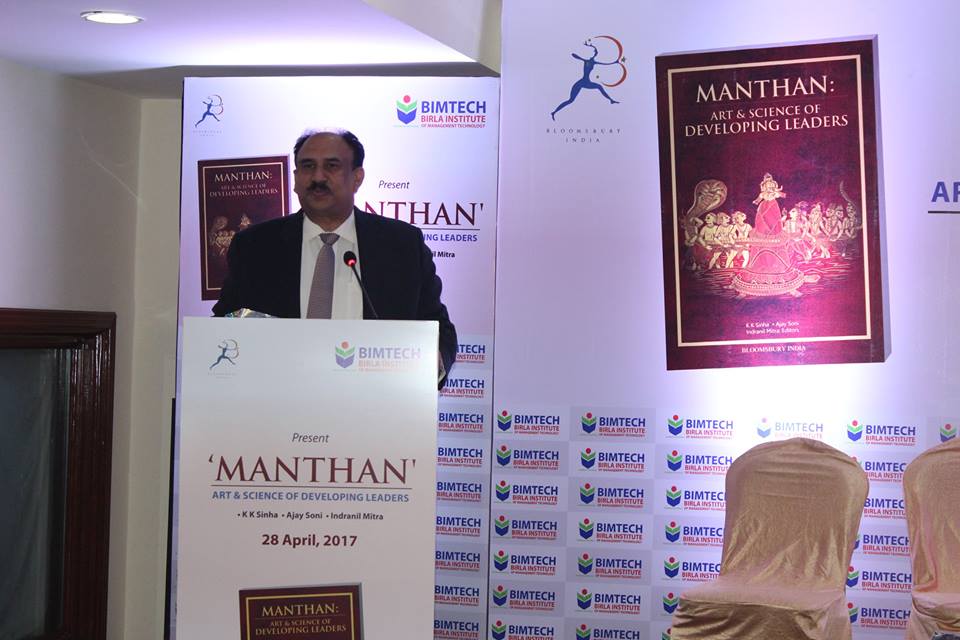Every crisis needs a different kind of leadership
Mumbai: In the volatile, uncertain, complex and ambiguous (VUCA) world of today, leaders are faced with ever new set of challenges. If competitive pressures are high then businesses are also increasingly confronted with ethical dilemmas ranging from scarcity of resources to being mindful of local community needs.

As Dr Santrupt Misra, CEO, Carbon Black Business and Director, Group Human Resources of the Aditya Birla Group said in Mumbai last weekend, “The world today faces challenges of global warming, refugee crisis, the corruption or the water crises, the depravation, the health care problems. Every crisis that is facing humanity today is crying out for a different kind of leadership that can find an answer.”
Dr Misra was speaking at the launch of the book ‘Manthan: Art and Science of Developing Leaders’ in Mumbai. The book is a synthesis of dialogue emerging out of 12 Leadership Round Tables organised by management school BIMTECH over three years where 55 participants from industry, academia, and consultancies shared their experiences, processes and best practices in leadership development.
As Misra pointed out, “Leadership is an evergreen subject as every generation from times immemorial had lessons to offer. Mahabharata is among the earliest examples of that.” But with changing contexts, leadership requirements also change. As Misra said, “It is important that every generation has a point of view on the subject because leadership is not a constant phenomenon. Leadership is about what happens to us and how we react to these situations.”

Ethical leadership is a big demand today as study after study has shown that employee engagement is higher in companies with high values. As Misra noted, “An individual in any organisation–a corporation, a society, a hospital or an NGO–expects out of his leaders honesty and integrity of purpose, commitment to that purpose. Individuals expect their leaders to bring in their perspectives, issues and needs into that purpose so that she becomes an integral part of that vision, purpose and the sense of commitment.”
In fact, the book Manthan owes its genesis to a focus on leadership with values. As Dr Harivansh Chaturvedi, Director, BIMTECH points out his institute has been developing ethical global leaders levered by the credo of ‘Excellence with Values’ through a series of management programs. “A deep connect with the industry over the past three decades led us on our journey to present our shared knowledge in the form of Manthan: Art & Science of developing leaders,” he says.
Are leaders perfect?
Given the tremendous expectations from leaders, are they able to meet up to them? In Misra’s view: “No leader is perfect. How often we as leaders in leadership position are comfortable with the inadequacies that we have? Are we comfortable with what we do not know, what we cannot do and are we aware of the daunting challenges before us? And despite those inadequacies can we still inspire positivism, can we still inspire aspirations, can we still inspire other people to join them in that sense of integrity and purpose?”
In his view, “Leadership is an act of creation. If at the end of exercise of leadership there is no creation, there is no leadership. People should be able to feel, see and experience an act of leadership.” He also said, “Leadership is about systemic capacity of any organisation—the higher the leadership capacity in an organisation the higher is the impact.”
Being Inclusive
An increasingly big challenge for leadership today is listening and assimilating the views of all its stakeholders and being inclusive, according to Misra. “It is surprising that channelizing our own human resources, material resources to a larger cause always takes a lot of debate–should we invest in this socially constructive project or that but while dropping a big bomb in any part of the world debate is not necessary.”
This begs leadership a question, he felt: “How can leadership create a mechanism where public debate must happen at the right place when it needs to happen. How do we get every leader to, in spite of the challenges of time and complexity, bring in a stakeholder perspective and a sense of inclusion?”

